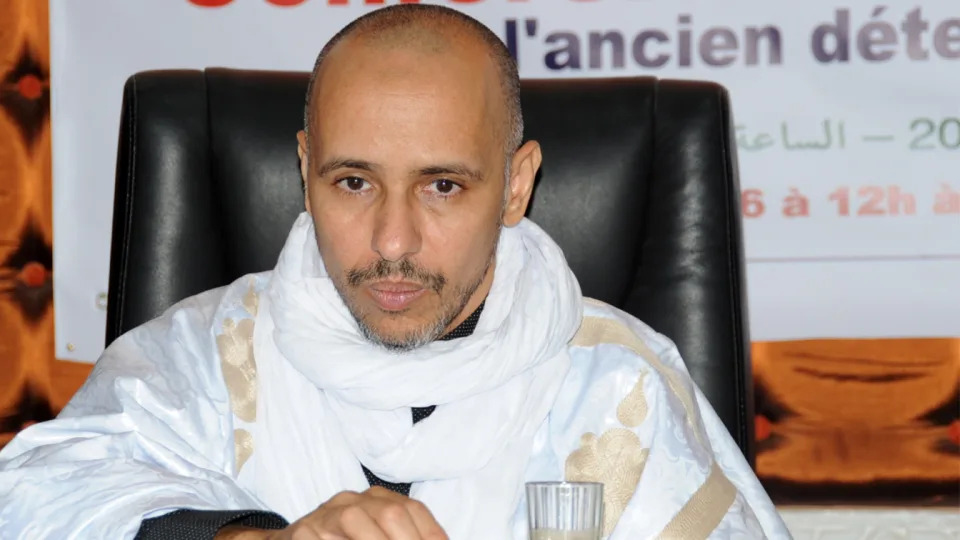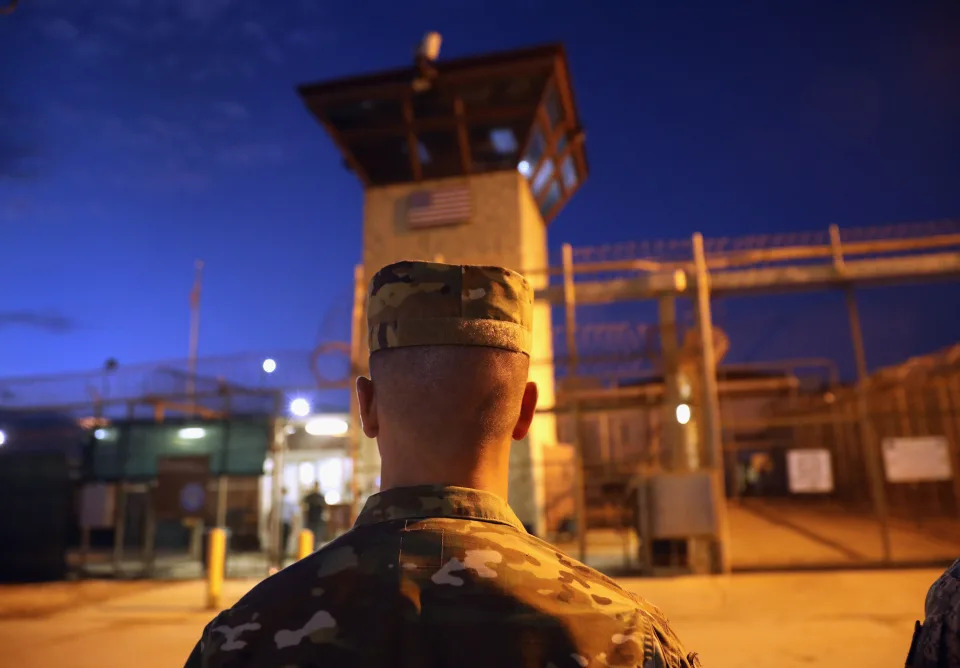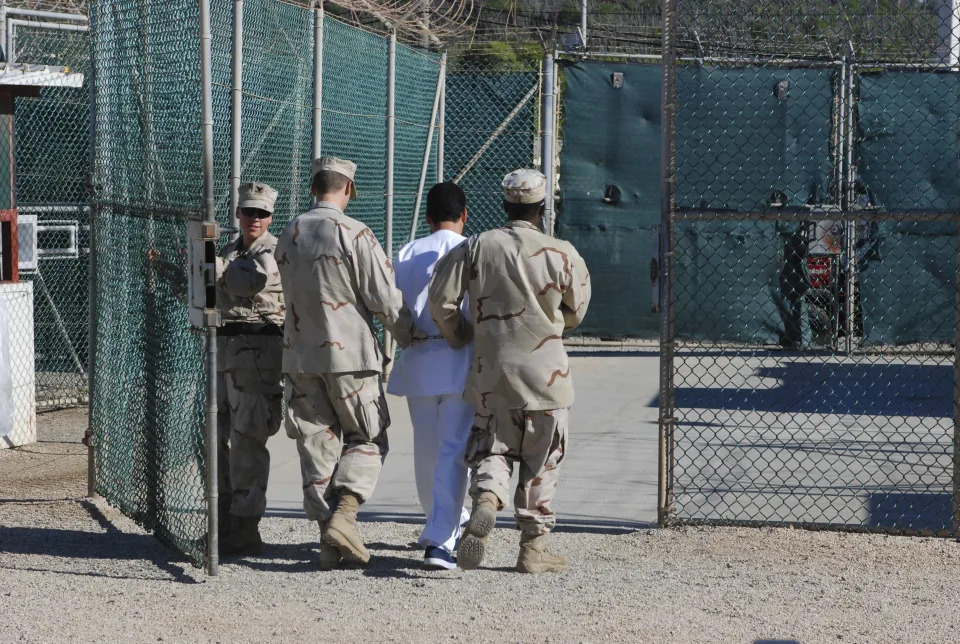Michael Isikoff
·Chief Investigative Correspondente
Fri., December 10, 2021
When the Senate Judiciary Committee held a hearing on the future of the U.S. detention facility at Guantánamo Bay this week, no Biden administration witnesses showed up — a glaring absence that underscored the paralysis among White House aides over how to achieve their publicly stated goal of shutting down the facility.
But Mohamedou Ould Slahi, who spent almost 14 years at Guantánamo and says he was brutally beaten and threatened with execution without ever being charged with a crime, has some advice for his onetime captors: Come clean about what was done to the detainees there, and transfer those accused of committing the Sept. 11 attacks to the United States so they can be openly tried in a court of law
But Mohamedou Ould Slahi, who spent almost 14 years at Guantánamo and says he was brutally beaten and threatened with execution without ever being charged with a crime, has some advice for his onetime captors: Come clean about what was done to the detainees there, and transfer those accused of committing the Sept. 11 attacks to the United States so they can be openly tried in a court of law
.

Former Guantánamo prisoner Mohamedou Ould Slahi at a press conference in Nouakchott, Mauritania, in 2016. (Stringer/AFP via Getty Images)
“They should take anyone who is alleged of those heinous crimes to court in America and let them face the music,” Slahi, 50, now a free man, said during an interview for the Yahoo News “Skullduggery” podcast. “How can you be the leader of the free world if you don’t respect the rule of law?”
Slahi’s story serves as a reminder that when Martin Luther King Jr. said “the arc of the moral universe is long, but it bends toward justice,” the bending can take an excruciatingly long time. It is a story that is powerfully told in “The Mauritanian,” a movie released earlier this year starring Jodie Foster as Slahi’s defense lawyer who helped secure his release after years of legal battles.
An engineering student from Mauritania who had gotten a scholarship to study in Germany, Slahi was swept up in an unrelenting international dragnet in the aftermath of the Sept. 11 attacks. At the request of U.S officials, he was detained by Mauritanian police, flown to Jordan in a secretive procedure known as rendition, and then transferred to Guantánamo in early 2002, where he was accused — falsely, as it turned out — of recruiting the hijackers who flew into the World Trade Center and the Pentagon.
When Slahi denied the allegations, his interrogators didn’t believe him. Then-Secretary of Defense Donald Rumsfeld ordered that he be subjected to harsh interrogations that went far beyond what was in the Army field manual.
That’s “when they start the torture,” said Slahi, recounting his experience via Zoom from Dakar, Senegal. “I remember one day I almost died because they put me in this fridge. And I’m telling you, like, when I say ‘the fridge,’ people don’t understand this because [another detainee] did not survive the fridge. He died in the fridge. It was too cold.
“And I remember this Marine guy, he was like, I was in the fridge and he was pouring water over me and I wore only a thin uniform and I was so cold. But I really wanted him to stop, I wanted to talk. But I couldn’t talk because my lips couldn’t move and my tongue, it was like a stone.”

A U.S. Army soldier outside the detention center at Naval Station Guantánamo Bay, Cuba, in 2016. (John Moore/Getty Images)
To be sure, U.S. intelligence officials had reason to be suspicious of Slahi. He seemed, at first blush, the Forrest Gump of Islamic terrorism. A devout Muslim, he had gone to Afghanistan in 1990 to fight with the mujahedeen against the Soviet occupation and joined al-Qaida. (This was during a period in which the CIA was arming the mujahedeen and years before al-Qaida was linked to acts of terrorism.)
When Slahi was studying in Germany, he had received a call from his cousin, a member of al-Qaida’s Shura Council, that was placed from Osama bin Laden’s satellite phone. (According to Slahi, his cousin wanted him to transfer funds for the medical expenses of his father.)
And when he returned to Germany, in 1999, a friend asked him to pick up and bring back to his apartment three visitors from the Middle East, one of whom was Ramzi Binalshibh, one of the organizers of the 9/11 attacks. (Slahi says he had no idea who Binalshibh was and the subject of terror attacks never came up.)
With so many suspicious links, Pentagon interrogators were determined to break him. He was, he says, beaten mercilessly and deprived of sleep for days at a time. Female interrogators — at times wearing masks — disrobed him. They taunted, humiliated, and, he said, sexually assaulted him.
“Still to this day, I have a lot of issues and problems when people touch me, you know, when people close to me touch me, I don’t want them to get close to me,” he said.
There was yet more: He was deprived of sleep for days at a time, bombarded with loud rock music, and, at one point, taken on a boat ride, force-fed seawater and threatened with execution. But what finally broke him was another ploy: His chief interrogator, an ex-Chicago cop with a checkered record of abusing prisoners, told him they were going to arrest his mother and bring her to Guantánamo.
The interrogator “came to me and he handed me a letter. He said this is a letter stating that my mother would be kidnapped, and he insinuated that she would be raped.” It was, he said, “like a stab through my heart.”

A detainee inside the U.S. military prison for “enemy combatants” at Guantánamo Bay, Cuba, in 2009. (John Moore/Getty Images)
“And the only way to stop that from happening was for me to confess to my, quote, unquote, ‘crimes.’ So I wanted to say anything, everything, whatever he wants.”
And so Slahi cracked, signing a lengthy detailed confession to being every bit the al-Qaida operative U.S. officials had accused him of being. In doing so, he was echoing a prewritten script based on what Binalshibh himself had confessed to — Slahi had recruited him for the 9/11 plot. As with Slahi’s confession, it was made only after similar torture.
“When I was tortured, I wanted only to please my interrogator,” said Slahi. “If they told me I was on Mars, I will tell them I was on Mars. If they told me, ‘You were the hijackers and you died on one of the planes,’ I would tell them I died on the plane.”
As ghastly as Slahi’s account sounds, much of it was documented in a searing 2009 report by the Senate Armed Services Committee. The report details how Guantánamo commanders, frustrated at Slahi’s lack of cooperation, proposed special interrogation methods to “shock” the prisoner into submission. He was to be hooded, shaved and doused in freezing cold water and subjected to sensory deprivation and “sleep adjustment,” the report states. Female interrogators were to “make close physical contact” in order to “increase his stress level.” Even before Rumsfeld signed off, some of those methods had begun, the report states. One of the interrogators told Slahi he would “very soon disappear down a very dark hole” and his “very existence will become erased.” He was “shown a fictitious letter” stating that his mother had been detained and might be “transferred to GTMO.”
Slahi’s confession never held up — and he ultimately renounced every word of it. (After reaffirming his denials, he was given two lie detector tests and passed both.) When a Marine officer, Lt. Col. Stuart Couch, was assigned to prosecute Slahi before a military commission, he secured access to the classified records of what was done to him and was appalled. “It became clear that what had been done to Slahi amounted to torture,” he said. Couch quit the case in protest. In 2010, Slahi’s lawyer, Nancy Hollander, persuaded a federal judge to order him freed in a habeas corpus hearing.

U.S. Navy guards escort a detainee at Guantánamo Bay in 2008. (Department of Defense/1st Lt. Sarah Cleveland/handout via Reuters)
But even that didn’t lead to Slahi’s release from Guantánamo. The Obama administration appealed the judge’s order, and his case dragged on for another six years. Finally, the government gave up and let Slahi return to his native Mauritania in October 2016.
By then, Slahi had written a book about his experiences, “Guantánamo Diary,” that became an international bestseller and turned him into a symbol of the U.S. government’s excesses in the war on terror. But still, Slahi says, he holds no personal animus against his interrogators. As documented in “In Search of Monsters,” a new documentary film by journalist John Goetz that was recently featured on the National Public Radio program “This American Life," he has even met and bonded with some of those interrogators.
“I tell you a secret, a lot of people really don’t believe that I don’t hold any grudge, and they’re wrong,” he said. Throughout his ordeal, “I took it upon myself to be a nice person and took a vow of kindness no matter what. And you cannot have a vow of kindness without forgiving people. This is what matters to me. I’m so selfish. I want to feel good, you know? And that’s my way to feel good.”
Former Guantánamo prisoner Mohamedou Ould Slahi at a press conference in Nouakchott, Mauritania, in 2016. (Stringer/AFP via Getty Images)
“They should take anyone who is alleged of those heinous crimes to court in America and let them face the music,” Slahi, 50, now a free man, said during an interview for the Yahoo News “Skullduggery” podcast. “How can you be the leader of the free world if you don’t respect the rule of law?”
Slahi’s story serves as a reminder that when Martin Luther King Jr. said “the arc of the moral universe is long, but it bends toward justice,” the bending can take an excruciatingly long time. It is a story that is powerfully told in “The Mauritanian,” a movie released earlier this year starring Jodie Foster as Slahi’s defense lawyer who helped secure his release after years of legal battles.
An engineering student from Mauritania who had gotten a scholarship to study in Germany, Slahi was swept up in an unrelenting international dragnet in the aftermath of the Sept. 11 attacks. At the request of U.S officials, he was detained by Mauritanian police, flown to Jordan in a secretive procedure known as rendition, and then transferred to Guantánamo in early 2002, where he was accused — falsely, as it turned out — of recruiting the hijackers who flew into the World Trade Center and the Pentagon.
When Slahi denied the allegations, his interrogators didn’t believe him. Then-Secretary of Defense Donald Rumsfeld ordered that he be subjected to harsh interrogations that went far beyond what was in the Army field manual.
That’s “when they start the torture,” said Slahi, recounting his experience via Zoom from Dakar, Senegal. “I remember one day I almost died because they put me in this fridge. And I’m telling you, like, when I say ‘the fridge,’ people don’t understand this because [another detainee] did not survive the fridge. He died in the fridge. It was too cold.
“And I remember this Marine guy, he was like, I was in the fridge and he was pouring water over me and I wore only a thin uniform and I was so cold. But I really wanted him to stop, I wanted to talk. But I couldn’t talk because my lips couldn’t move and my tongue, it was like a stone.”
A U.S. Army soldier outside the detention center at Naval Station Guantánamo Bay, Cuba, in 2016. (John Moore/Getty Images)
To be sure, U.S. intelligence officials had reason to be suspicious of Slahi. He seemed, at first blush, the Forrest Gump of Islamic terrorism. A devout Muslim, he had gone to Afghanistan in 1990 to fight with the mujahedeen against the Soviet occupation and joined al-Qaida. (This was during a period in which the CIA was arming the mujahedeen and years before al-Qaida was linked to acts of terrorism.)
When Slahi was studying in Germany, he had received a call from his cousin, a member of al-Qaida’s Shura Council, that was placed from Osama bin Laden’s satellite phone. (According to Slahi, his cousin wanted him to transfer funds for the medical expenses of his father.)
And when he returned to Germany, in 1999, a friend asked him to pick up and bring back to his apartment three visitors from the Middle East, one of whom was Ramzi Binalshibh, one of the organizers of the 9/11 attacks. (Slahi says he had no idea who Binalshibh was and the subject of terror attacks never came up.)
With so many suspicious links, Pentagon interrogators were determined to break him. He was, he says, beaten mercilessly and deprived of sleep for days at a time. Female interrogators — at times wearing masks — disrobed him. They taunted, humiliated, and, he said, sexually assaulted him.
“Still to this day, I have a lot of issues and problems when people touch me, you know, when people close to me touch me, I don’t want them to get close to me,” he said.
There was yet more: He was deprived of sleep for days at a time, bombarded with loud rock music, and, at one point, taken on a boat ride, force-fed seawater and threatened with execution. But what finally broke him was another ploy: His chief interrogator, an ex-Chicago cop with a checkered record of abusing prisoners, told him they were going to arrest his mother and bring her to Guantánamo.
The interrogator “came to me and he handed me a letter. He said this is a letter stating that my mother would be kidnapped, and he insinuated that she would be raped.” It was, he said, “like a stab through my heart.”
A detainee inside the U.S. military prison for “enemy combatants” at Guantánamo Bay, Cuba, in 2009. (John Moore/Getty Images)
“And the only way to stop that from happening was for me to confess to my, quote, unquote, ‘crimes.’ So I wanted to say anything, everything, whatever he wants.”
And so Slahi cracked, signing a lengthy detailed confession to being every bit the al-Qaida operative U.S. officials had accused him of being. In doing so, he was echoing a prewritten script based on what Binalshibh himself had confessed to — Slahi had recruited him for the 9/11 plot. As with Slahi’s confession, it was made only after similar torture.
“When I was tortured, I wanted only to please my interrogator,” said Slahi. “If they told me I was on Mars, I will tell them I was on Mars. If they told me, ‘You were the hijackers and you died on one of the planes,’ I would tell them I died on the plane.”
As ghastly as Slahi’s account sounds, much of it was documented in a searing 2009 report by the Senate Armed Services Committee. The report details how Guantánamo commanders, frustrated at Slahi’s lack of cooperation, proposed special interrogation methods to “shock” the prisoner into submission. He was to be hooded, shaved and doused in freezing cold water and subjected to sensory deprivation and “sleep adjustment,” the report states. Female interrogators were to “make close physical contact” in order to “increase his stress level.” Even before Rumsfeld signed off, some of those methods had begun, the report states. One of the interrogators told Slahi he would “very soon disappear down a very dark hole” and his “very existence will become erased.” He was “shown a fictitious letter” stating that his mother had been detained and might be “transferred to GTMO.”
Slahi’s confession never held up — and he ultimately renounced every word of it. (After reaffirming his denials, he was given two lie detector tests and passed both.) When a Marine officer, Lt. Col. Stuart Couch, was assigned to prosecute Slahi before a military commission, he secured access to the classified records of what was done to him and was appalled. “It became clear that what had been done to Slahi amounted to torture,” he said. Couch quit the case in protest. In 2010, Slahi’s lawyer, Nancy Hollander, persuaded a federal judge to order him freed in a habeas corpus hearing.
U.S. Navy guards escort a detainee at Guantánamo Bay in 2008. (Department of Defense/1st Lt. Sarah Cleveland/handout via Reuters)
But even that didn’t lead to Slahi’s release from Guantánamo. The Obama administration appealed the judge’s order, and his case dragged on for another six years. Finally, the government gave up and let Slahi return to his native Mauritania in October 2016.
By then, Slahi had written a book about his experiences, “Guantánamo Diary,” that became an international bestseller and turned him into a symbol of the U.S. government’s excesses in the war on terror. But still, Slahi says, he holds no personal animus against his interrogators. As documented in “In Search of Monsters,” a new documentary film by journalist John Goetz that was recently featured on the National Public Radio program “This American Life," he has even met and bonded with some of those interrogators.
“I tell you a secret, a lot of people really don’t believe that I don’t hold any grudge, and they’re wrong,” he said. Throughout his ordeal, “I took it upon myself to be a nice person and took a vow of kindness no matter what. And you cannot have a vow of kindness without forgiving people. This is what matters to me. I’m so selfish. I want to feel good, you know? And that’s my way to feel good.”
No comments:
Post a Comment